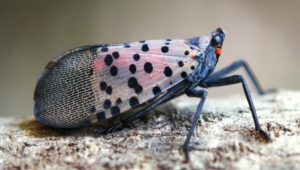Keep an Eye Out for Spotted Lanternfly
go.ncsu.edu/readext?612465
en Español / em Português
El inglés es el idioma de control de esta página. En la medida en que haya algún conflicto entre la traducción al inglés y la traducción, el inglés prevalece.
Al hacer clic en el enlace de traducción se activa un servicio de traducción gratuito para convertir la página al español. Al igual que con cualquier traducción por Internet, la conversión no es sensible al contexto y puede que no traduzca el texto en su significado original. NC State Extension no garantiza la exactitud del texto traducido. Por favor, tenga en cuenta que algunas aplicaciones y/o servicios pueden no funcionar como se espera cuando se traducen.
Português
Inglês é o idioma de controle desta página. Na medida que haja algum conflito entre o texto original em Inglês e a tradução, o Inglês prevalece.
Ao clicar no link de tradução, um serviço gratuito de tradução será ativado para converter a página para o Português. Como em qualquer tradução pela internet, a conversão não é sensivel ao contexto e pode não ocorrer a tradução para o significado orginal. O serviço de Extensão da Carolina do Norte (NC State Extension) não garante a exatidão do texto traduzido. Por favor, observe que algumas funções ou serviços podem não funcionar como esperado após a tradução.
English
English is the controlling language of this page. To the extent there is any conflict between the English text and the translation, English controls.
Clicking on the translation link activates a free translation service to convert the page to Spanish. As with any Internet translation, the conversion is not context-sensitive and may not translate the text to its original meaning. NC State Extension does not guarantee the accuracy of the translated text. Please note that some applications and/or services may not function as expected when translated.
Collapse ▲Keep an Eye Out for Spotted Lanternfly
This Summer

NCDA&CS – Plant Industry Division has received numerous reports of potential Spotted Lanternfly (SLF) finds in our state over the past year and although some of the images sent to us did contain a live SLF life stage, our investigation and follow up surveys have not found any established populations. However, the increasing spread of SLF in Virginia has us especially concerned that the pest may have hitchhiked to NC this summer. Finding and reacting immediately to SLF will be the only chance we have at control, so we are relying heavily on N.C. Cooperative Extension helping us spread the word to Master Gardeners and citizens to be on the lookout and report any potential SLF sightings at badbug@ncagr.gov .
The North Carolina Department of Agriculture and Consumer Services Plant Industry Division is asking travelers to several northeastern states to take precautions against the spread of the highly destructive Spotted Lanternfly this summer. “If your summer travel plans have you driving through Pennsylvania, Maryland, Virginia, Delaware or New Jersey, please review the Spotted Lanternfly quarantine map and do your part to prevent bringing the pest to our state.,” said Agriculture Commissioner Steve Troxler. “This invasive pest poses a significant threat to our $91.8 billion agriculture industry.”
North Carolina has no reports of this invasive pest. Spotted Lanternfly is an invasive planthopper native to China that could cause billions of dollars in loss to NC agriculture, tourism and trade should it become established in our state. This pest is a hitchhiker and can be easily moved long distances on vehicles, campers, and outdoor equipment. If you plan to visit any of the indicated northeastern states in which Spotted Lanternfly has been found, it is recommended you thoroughly wash and inspect your vehicles before leaving. Also, do not move firewood. All life stages of Spotted Lanternfly can hitchhike, but the eggs and adults pose the greatest risk for movement. In northern states, adults can lay their eggs on any outdoor flat surfaces from July to December. We hope you enjoy your summer travels, and we appreciate your attention to ensure this pest does not hitch a ride home with you.




